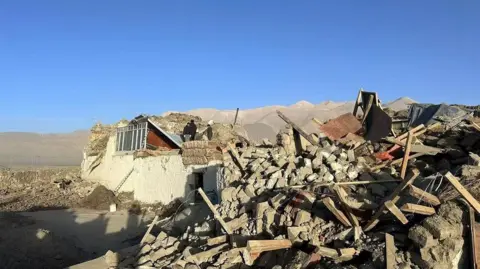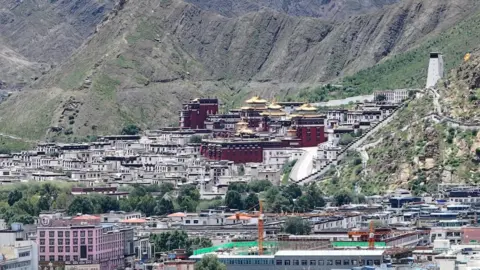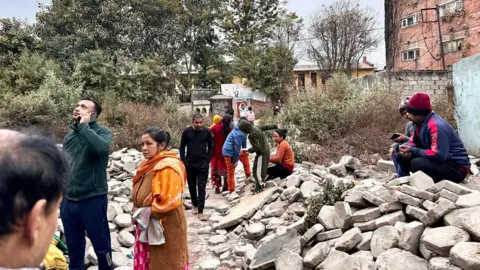 Reuters
ReutersAt least 53 people have been confirmed dead and 62 are injured after a major earthquake struck the mountainous Tibet region on Tuesday morning, Chinese state media reported.
The earthquake that hit Tibet’s holy Shigatse city around 09:00 local time (01:00 GMT) had a magnitude of 7.1 and a depth of 10 kilometres (six miles), according to data from the US Geological Survey, which also showed a series of aftershocks in the area.
Tremors were also felt in neighbouring Nepal and parts of India.
Earthquakes are common in the region, which lies on a major geological fault line.
Shigatse is considered one of the holiest cities of Tibet. It is the traditional seat of the Panchen Lama, a key figure of Tibetan Buddhism whose spiritual authority is second only to the Dalai Lama.
Tibetan Gedhun Choekyi Niyima who was identified as the reincarnated Panchen Lama was disappeared by China when he was six years old. China then chose its own Panchen Lama.
The current Dalai Lama fled Tibet to India in 1959 and has since been seen as an alternative source of power for Tibetans who resent Beijing’s control of the region. Many believe China will also choose its own Dalai Lama when the current one dies.
Videos published by China’s state broadcaster CCTV showed destroyed houses and collapsed buildings, as rescue workers waded through debris and handed out thick blankets to locals.
Temperatures in Tingri county, near the earthquake’s epicentre, are around -8C (17.6F), and will drop to -18 this evening, according to the China Meteorological Administration.
Both power and water in the region have been disrupted.
Sitting at the foot of Mount Everest, Tingri county is a popular base for climbers preparing to ascend the world’s tallest peak.
Everest sightseeing tours in Tingri, originally scheduled for Tuesday morning, have been cancelled, a tourism staff told local media, adding that the sightseeing area has been fully closed.
There were three visitors in the sightseeing area who have all been moved to an outdoor area for safety, they said.
Chinese state media reported the earthquake as having a slightly lesser magnitude of 6.8, causing “obvious” tremors and leading to the damage of more than 1,000 houses. There have been several strong aftershocks.
 Getty Images
Getty ImagesJiang Haikun, a researcher at the China Earthquake Networks Center, told CCTV that while another earthquake of around magnitude 5 may still occur, “the likelihood of a larger earthquake is low”.
Since China annexed Tibet in the 1950s, it has kept a tight control over the autonomous region, including its media and internet access.
A hotel resident in Shigatse told Chinese media outlet Fengmian News that he was jolted awake by a wave of shaking. He said he grabbed his socks and rushed out onto the street, where he saw helicopters circling above.
“It felt like even the bed was being lifted,” he said, adding that he immediately knew it was an earthquake because Tibet recently experienced multiple smaller quakes.
 Getty Images
Getty ImagesThe Chinese air force has launched rescue efforts and drones to the affected area.
Chinese president Xi Jinping has also called for all-out search and rescue efforts to minimise casualties and resettle affected residents.
While tremors were felt in Nepal, no damage or casualties were reported, a local official in Nepal’s Namche region, near Everest, told AFP.
The region, which lies near a major fault line of the Indian and Eurasian tectonic plates, is home to frequent seismic activity. In 2015, a 7.8 magnitude earthquake near Kathmandu, the capital of Nepal, killed nearly 9,000 people and injured over 20,000.



